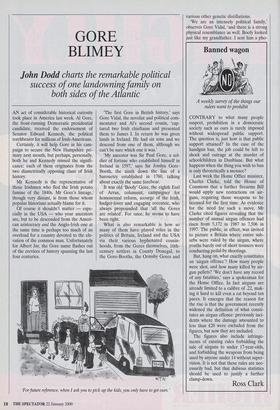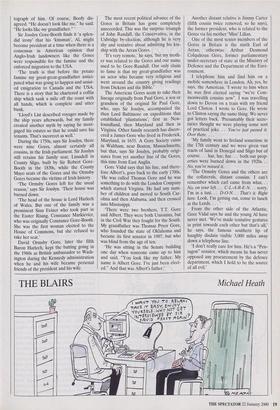GORE BLIMEY
John Dodd charts the remarkable political
success of one landowning family on both sides of the Atlantic
AN act of considerable historical curiosity took place in America last week. Al Gore, the front-running Democratic presidential candidate, received the endorsement of Senator Edward Kennedy, the political torchbearer for millions of Irish-Americans.
Certainly, it will help Gore in his cam- paign to secure the New Hampshire pri- mary next month, but perhaps, personally, both he and Kennedy missed the signifi- cance: each of them originates from the two diametrically opposing clans of Irish history.
Mr Kennedy is the representative of those Irishmen who fled the Irish potato famine of the 1840s. Mr Gore's lineage, though very distant, is from those whom popular historians actually blame for it.
Of course it shouldn't matter — espe- cially in the USA — who your ancestors are, but to be descended from the Ameri- can aristocracy and the Anglo-Irish one at the same time is perhaps too much of an overload for a country devoted to the ele- vation of the common man. Unfortunately for Albert Jnr, the Gore name flashes out of the crevices of history spanning the last four centuries. `The first Gore in British history,' says Gore Vidal, the novelist and political com- mentator and Al's second cousin, `cap- tured two Irish chieftains and presented them to James I. In return he was given lands in Ireland. He had six sons and we descend from one of them, although we can't be sure which one it was.'
`My ancestor was Sir Paul Gore, a sol- dier of fortune who established himself in Ireland in 1597,' says Sir Josslyn Gore- Booth, the ninth down the line of a baronetcy established in 1760, talking about exactly the same forebear.
It was old 'Boofy' Gore, the eighth Earl of Arran, columnist, campaigner for homosexual reform, scourge of the Irish, badger-lover and engaging eccentric, who always propounded that 'all the Gores are related'. For once, he seems to have been right.
What is also remarkable is how so many of them have played roles in the politics of Britain, Ireland and the USA via their various hyphenated cousin- hoods, from the Gores themselves, 16th- century settlers in County Donegal, to the Gore-Booths, the Ormsby Gores and For future reference, when I ask you to pick up the kids, you only have to get ours.' various other genetic distillations.
`We are an intensely political family,' observes Gore Vidal, 'and there is a strong physical resemblance as well. Boofy looked just like my grandfather. I sent him a pho- tograph of him. Of course, Boofy dis- agreed. "He doesn't look like me," he said. "He looks like my grandfather." ' Sir Josslyn Gore-Booth finds it 'a splen- did irony' that his 'kinsman', Al, might become president at a time when there is a consensus in American opinion that Anglo-Irish landowners like the Gores were responsible for the famine and the enforced migration to the USA. `The truth is that before the potato famine my great-great-grandfather antici- pated what was going to happen and assist- ed emigration to Canada and the USA. There is a story that he chartered a coffin ship which sank a mile off the coast with all hands, which is complete and utter bunk.
`Lloyd's List described voyages made by the ship years afterwards, but my family created another myth by saying he mort- gaged his estates so that he could save his tenants. That's incorrect as well.'
During the 1750s, says Sir Josslyn, there were nine Gores, almost certainly all cousins, in the Irish parliament. Sir Josslyn still retains his family seat, Lissadell in County Sligo, built by Sir Robert Gore- Booth in the 1830s, while the County Mayo seats of the Gores and the Ormsby Gores became the victims of Irish history.
`The Ormsby Gores left for the usual reason,' says Sir Josslyn. 'Their house was burned down.
The head of the house is Lord Harlech of Wales. But one of the family was a prominent Sinn Feiner who took part in the Easter Rising, Constance Markievicz, who was originally Constance Gore-Booth. She was the first woman elected to the House of Commons, but she refused to take her seat.'
David Ormsby Gore, later the fifth Baron Harlech, kept the batting going in the 1960s as British ambassador to Wash- ington during the Kennedy administration when he and his wife became personal friends of the president and his wife. The most recent political advance of the Gores in Britain has gone completely unrecorded. This was the surprise triumph of John Randall. the Conservative, in the Uxbridge by-election, although he is very shy and tentative about admitting his kin- ship with the Arran Gores.
`It's very remote,' he says, 'but my moth- er was related to the Gores and our name used to be Gore-Randall. Our only claim to fame is that my great-grandfather was an actor who became very religious and went around the country giving readings from Dickens and the Bible.'
The American Gores seem to take their lineage originally from Paul Gore, a son or grandson of the original Sir Paul Gore, who, says Sir Josslyn, accompanied the then Lord Baltimore on expeditions that established 'plantations', first in New- foundland, then Maryland and then in Virginia. Other family research has discov- ered a James Gore who lived in Frederick, Maryland, in 1635. A Gore Society exists in Waltham, near Boston, Massachusetts, but that, says Sir Josslyn, probably origi- nates from yet another line of the Gores, this time from East Anglia.
Gore Vidal says that his line, and there- fore Albert's, goes back to the early 1700s. `He was called Thomas Gore and he was something to do with the London Company which started Virginia. He had any num- ber of children and moved to South Car- olina and then Alabama, and then crossed into Mississippi.
`There were two brothers, T.T. Gore and Albert. They were both Unionists, but in the Civil War they fought for the South. My grandfather was Thomas Pryor Gore, who founded the state of Oklahoma and became its first senator in 1907, but who was blind from the age of ten.
`He was sitting in the Senate building one day when someone came up to him and said, "You look like my father. My name is Albert Gore. I've just been elect- ed." And that was Albert's father.' Another distant relative is Jimmy Carter (fifth cousin twice removed, so he says), the former president, who is related to the Gores via his mother 'Miss' Lilian.
One of the most senior members of the Gores in Britain is the ninth Earl of Arran, otherwise Arthur Desmond Colquhoun Gore, former parliamentary under-secretary of state at the Ministry of Defence and the Department of the Envi- ronment.
I telephone him and find him on a mobile somewhere in London. Ah, yes, he says, the American. 'I wrote to him when he was first elected saying "we're Com- monwealth cousins now". I was travelling down to Devon on a train with my friend Lord Clinton. I wrote to Gore. He wrote to Clinton saying the same.thing. We never got letters back. 'Presumably their secre- taries thought we were playing some sort of practical joke. . . You've just passed it. Over there. . . .
`My family went to Ireland sometime in the 17th century and we were given vast tracts of land in Donegal and Sligo but of course. . . har, har, har. . . both our prop- erties were burned down in the 1920s.. . No, you've missed it.
`The Ormsby Gores and the others are the collaterals, distant cousins. I can't remember which earl came from what.. . No, on your left. . . C-L-A-R-E-N. . sorry, I'm in a taxi... D-O-N. . That's it. Right here. Look, I'm getting out, come to lunch at the Lords. . '
From the other side of the Atlantic, Gore Vidal says he and the young Al have never met. 'We've made tentative gestures in print towards each other but that's all,' he says, the famous southern lip of haughty disdain visible 3,000 miles away down a telephone line.
`I don't really care for him. He's a "Pen- tagon" senator, which means he has never opposed any procurement by the defence department, which I hold to be the source of all evil.'



























































 Previous page
Previous page